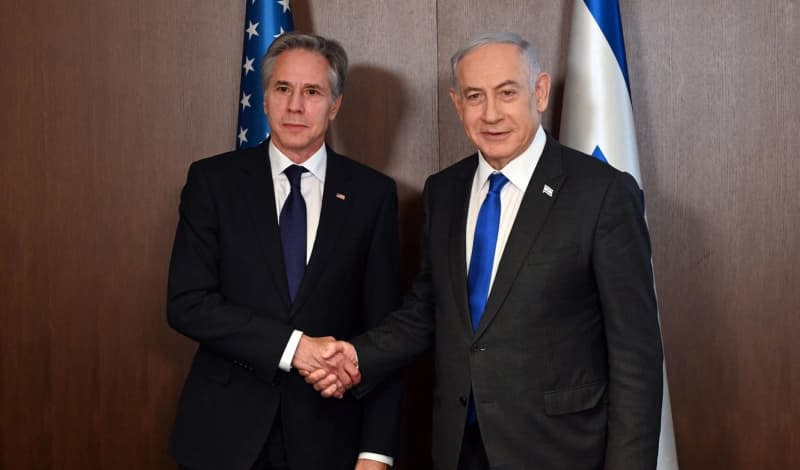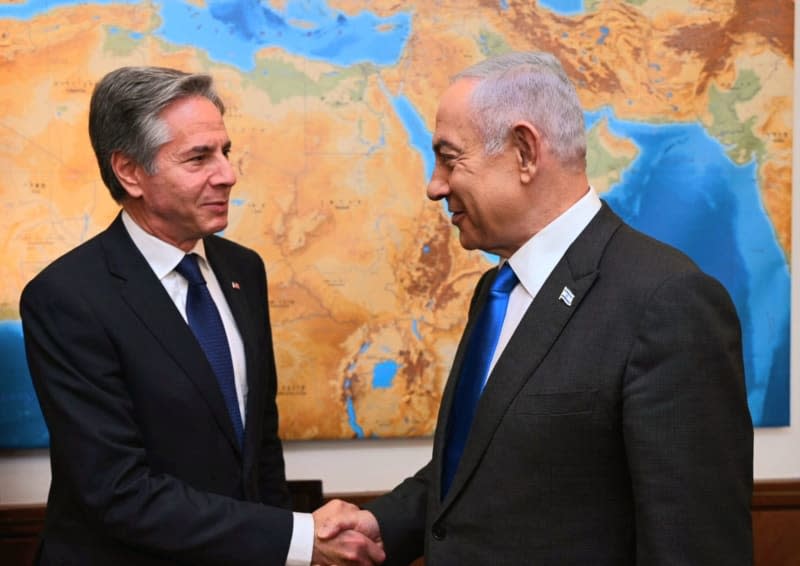Blinken, Netanyahu meet as both face tough domestic politics

- Oops!Something went wrong.Please try again later.
- Oops!Something went wrong.Please try again later.
- Oops!Something went wrong.Please try again later.
US Secretary of State Antony Blinken, in Israel for talks with Prime Minister Benjamin Netanyahu, is pushing for a rapid ceasefire and release of hostages held by Hamas, as the world waits for a response from the Palestinian militant group.
Blinken met with Israeli President Isaac Herzog on Wednesday prior to meeting with Netanyahu.
The Israeli Cogat authority, which is responsible for implementing policy in the West Bank and Gaza, said Blinken visited the Kerem Shalom checkpoint on Israel's border with the coastal strip to get an idea of the situation on the ground. He also plans to visit the port of Ashdod.
The visit comes as US universities across the country are exploding with pro-Palestinian protests. Overnight in Los Angeles, or around midday in Central Europe, violence erupted after the university declared the demonstrators' encampment illegal.
Counter-demonstrators clashed with pro-Palestinian demonstrators and the LA police was called to the scene.
At Columbia University in New York City, police officers cleared a building that had been occupied by pro-Palestinian demonstrators as the university administration said those who had occupied the hall would be expelled from the university. Numerous protests rage on many other US campuses.
Back in the Middle East, leaders and observers are not only waiting for a Hamas response but also for Israel's next move.
Israel had announced a rapid start to the controversial offensive in Rafah in the south of the Gaza Strip on the border with Egypt if no agreement is reached.
However, Netanyahu made it clear that a Rafah offensive is not dependent on a deal.
"We will go into Rafah and smash the Hamas battalions there - with or without a deal," Netanyahu said at a meeting with relatives of Israeli hostages and fallen soldiers on Tuesday, according to his office. "The idea that we will stop the war before all its objectives have been achieved is out of the question."
Netanyahu is under strong pressure from his far-right coalition partners, who made themselves heard once again on Wednesday with comments from a right-wing minister who said getting back "22 or 33 people" is not worth it, sparking outrage.
Minister Orit Strock from the Religious Zionism party said Israel's war aims should not be sacrificed for the return of a small number of hostages.
She spoke of a "terrible deal" that also jeopardized the hostages who were not part of it. The war aims could not be "thrown in the bin in order to save 22 or 33 people," she said.
Israeli opposition leader Yair Lapid responded on X, formerly Twitter, that a "government with 22 or 33 extremist coalition members has no right to exist."
As the Wall Street Journal reported, citing Egyptian officials, the proposal for an agreement envisages two stages. The first stage would involve the release of at least 20 hostages within a three-week ceasefire in exchange for an unspecified number of Palestinian prisoners. The duration of the ceasefire could be extended by one day for each additional hostage, it said.
A second stage would include a 10-week ceasefire in which Hamas and Israel could agree on a more extensive release of hostages and a longer pause in fighting that could last up to a year.
However, Hamas has so far insisted on a complete end to the war, which Israel rejects
Both sides are not negotiating directly, but via the mediators Egypt, Qatar and the US.
"We’re determined to get a ceasefire that brings the hostages home, and to get it now. And the only reason that that wouldn't be achieved is because of Hamas," Blinken said in Tel Aviv.
"At the same time, even as we're working with relentless determination to get the ceasefire that brings the hostages home, we also have to be focused on people in Gaza who are suffering in this crossfire of Hamas’s making, and so focused on getting them the assistance they need - the food, medicine, the water, the shelter - is also very much on our minds and in the work that we're doing."


